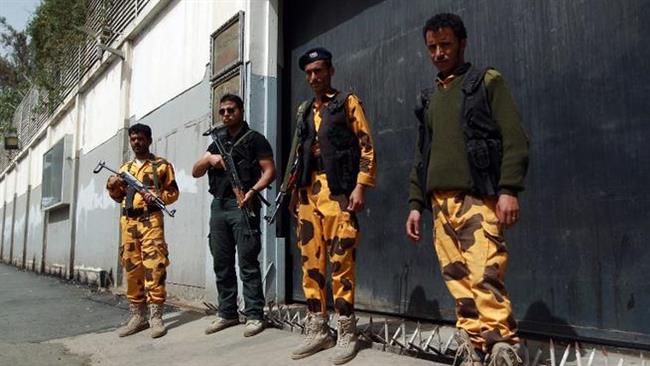
Yemeni soldiers stand guard outside the Egyptian embassy in the capital, Sana’a, after it closed on February 23, 2015. (Photo: Press TV/AFP)
Sana’a, 5 Jumadil Awwal 1436/24 February 2015 (MINA) – Egypt has closed its embassy in Yemen and evacuated its ambassador as well as all the diplomatic staff over what it termed as “deteriorating security situation” in the impoverished Arab state.
“The Egyptian diplomatic mission in Sana’a headed by Ambassador Youssef al-Sharqawi returned to Cairo on Monday due to the bad security situation in Yemen,” Egypt’s official MENA news agency reported.
“The Egyptian embassy in Sana’a was closed after the departure of the mission,” it added, Press TV quoted by Mi’raj Islamic News Agency (MINA) as reporting.
Embassy closures in Yemen
Also Read: Syria, Jordan Condemn Netanyahu’s Visit to Occupied Syrian Buffer Zone
Egypt is not the first country to shut its embassy in Sana’a.
On February 16, Turkey also closed its embassy in the Yemeni capital and suspended its diplomatic activities there.
“We hope that the authority of the state is reestablished in Yemen so that we can resume our diplomatic services in this friendly state,” the Turkish Foreign Ministry said in a statement.
Earlier in the day, Japan had said it was temporarily closing its embassy for fears of worsening violence.
Also Read: UNIFIL Reports Over 7,300 Israeli Violations of Lebanese Airspace Since Ceasefire
The Emirati Ministry of Foreign Affairs announced on February 14 the closure of the United Arab Emirates diplomatic mission in Yemen due to what it claimed to be the increasing deterioration of the political and security situation in the country.
“We hope that the authority of the state is reestablished in Yemen so that we can resume our diplomatic services in this friendly state,” the Turkish Foreign Ministry said in a statement.
Earlier in the day, Japan had said it was temporarily closing its embassy for fears of worsening violence.
The Emirati Ministry of Foreign Affairs announced on February 14 the closure of the United Arab Emirates diplomatic mission in Yemen due to what it claimed to be the increasing deterioration of the political and security situation in the country.
Also Read: Russia Condemns UN Gaza Resolution, Says It Contradicts Palestinian Statehood
On February 11, the French embassy in Yemen said in a statement that it will be closed until further notice, calling on all French nationals to leave the country due to “recent political developments and security reasons.”
The personnel of the British embassy as well as the British ambassador had left the Yemeni capital earlier in the day, UK Government Minister at the Foreign and Commonwealth Office Tobias Ellwood said.
“The security situation in Yemen has continued to deteriorate over recent days. Regrettably we now judge that our embassy staff and premises are at increased risk,” Ellwood said in a statement posted on the embassy’s website, adding, “We have therefore decided to withdraw diplomatic staff and temporarily suspend the operations of the British embassy in Sana’a.”
In a similar move on the same day, the Unite States closed its embassy in Yemen, citing security concerns.
Also Read: Israeli Airstrike on Palestinian Refugee Camp in Lebanon Kills 13
‘Yemen talks should be moved from Sana’a’
Yemen’s President Abd Rabbu Mansour Hadi, whose resignation was handed to and rejected by the country’s parliament on January 22, has demanded that the UN-sponsored talks currently being held in Sana’a to resolve a political crisis in the country be transferred to a different location.
On Monday, Benomar said Hadi had expressed “reservations about continuing the current negotiations in Sana’a.”
According to Benomar, the Yemeni leader also “requested they be transferred to a ‘safe place’ to which the parties should agree.”
Also Read: UN Security Council Adopts US-backed Resolution to Deploy International Force in Gaza
Ansarullah revolutionaries
The Ansarullah revolutionaries say the Yemeni government has been incapable of properly running the affairs of the country and providing security.
In September 2014, the Ansarullah fighters gained control of Sana’a. Before gaining control of the capital, the Houthis had set a deadline for the political parties to put aside differences and fill the power vacuum, but the deadline was missed without any change in the country’s political scene.
The Houthi movement played a key role in the popular 2011 revolution that forced the country’s former dictator, Ali Abdullah Saleh, to quit after 33 years of rule. (T/P010/P3)
Also Read: UNIFIL Condemns Israeli Tank Fire Targeting Peacekeepers in South Lebanon
Mi’raj Islamic News Agency (MINA)










![Israeli tanks and APC’s gather by the Israeli – Lebanese border. Amid Israel’s escalating campaign against Hezbollah in Lebanon on September 30, 2024. [Erik Marmor/Getty Images]](https://en.minanews.net/wp-content/uploads/2024/10/IMG_20241001_203226-300x197.jpg)























 Mina Indonesia
Mina Indonesia Mina Arabic
Mina Arabic